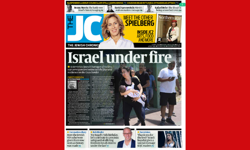Family owned and run, independent and financially secure, William Reed Business Media is a unique mix of traditional values built over 150-plus years and a 21st century vision underpinned by a commitment to, understanding of and passion for change - something which is both the greatest opportunity and also the biggest challenge facing publishers today, says managing director Lorraine Hendle.
"We are faring pretty well - though recession and the fundamental change in the media landscape it coincided with have had an impact on everyone. All of us have been forced to look at things differently. Everyone has had to become even more market-focused and flexible enough to respond to a rapidly changing environment," she explains.
"The markets we serve - the fast moving consumer goods sector especially, which is not called 'fast' for nothing - are changing faster than ever, both in terms of our consumers' media consumption behaviour and their content needs."
Speed of response is one of the major challenges facing publishers today, believes Hendle, who joined WRBM in 1998 as sales development manager from RBI where she held a number of commercial roles across the preceding ten years. But so, too, is changing at the right pace in the right way - which can take time. WRBM is no stranger to playing the long game, however, and the company has perfected the art of balancing one against the other over many years.
Victorian roots
Established with the launch of its first title, The Grocer, in 1862 by company-founder William Reed - whose fifth generation descendent, Charles Reed, is today group managing director - the company initially grew organically with the launch of a host of other titles serving both related and other business sectors - Tobacco Trade Review, for example, and Brewers Journal. More recently, growth has been powered by acquisitions, extending existing print brands online and into live, face to face events and creating new brands - some of which have a print component, some of which do not.
The company's multi-channel strategy prompted a change of name - from William Reed Publishing, back in 2008. A year later, the company launched its own e-learning division and acquired Decision News Media SAS, a Montpelier-based publisher of FoodNavigator.com and sixteen other food, drinks, nutrition, pharmaceuticals and cosmetics websites. Then, in 2011, it acquired The Publican and merged it into the Morning Advertiser creating The Publican's Morning Advertiser.
Today, WRBM's food and drink portfolio - spanning manufacturing, retail, wholesale and hospitality - sits alongside portfolios dealing with pharmaceuticals and cosmetics with revenue streams spanning print, online, events and exhibitions, conferences, data information / insight, and directories and guides. And though ten years ago it had no international business, it now has offices in New York, South America and Singapore and has recently launched The Grocer into India.
Combined, the company now has more than two million monthly unique visitors across more than 40 digital newsletters, publications and data sources; 710,000 readers across ten print titles; and 50,000 visitors a year to its live events, conferences and exhibitions. And - unusually for a B2B publisher in the 21st century digital media environment - it has a successful recruitment ad business.
Buoyant recruitment site!
Recruitment advertising was once a major revenue stream for B2B print publishers, of course. Unlike many, however, WRBM has retained a dominant position despite the migration of recruitment away from print online and into the hands of pure-play digital job boards. Its weapon is William Reed RECRUIT - a one-stop 'shop' for recruitment advertisers to access its entire food and drink media and online communication brands which is the destination for recruiters and jobseekers across the food, drinks and hospitality sectors, especially - with 3,300 vacancies posted at any one time.
Hendle puts the RECRUIT platform's success down to a number of factors, including brand heritage, WRBM's decision to continue to advertise its strengths to its clients throughout the recession - even when recruitment was down, and its on-going investment in the platform's technology and content, which is optimised to better attract "passive jobseekers". Competition from low cost online recruitment sites has lowered expectations of yield - as price competition in any line of business does, she admits. But WRBM's is a value proposition.
Our value proposition
"Ad revenue is still very important for us and the biggest change has been on the recruitment side. But what has set us apart and helped us retain a healthy share as recruitment migrated online is our approach. Ours isn't a commodity sell, but a value proposition. Our jobs aren't any jobs, but the best jobs in FMCG - and this sets us apart from online job sites," Hendle says.
"We are known for having the right job and the right people who come to us for our content, our brand heritage and our reputation for having the best vacancies. Word of mouth has been - and still is - very important."
Display advertising has held up, too - thanks again to WRBM's value proposition and its growing focus on providing cross-platform advertising solutions. "One reason why we have fared better than many of our peers is our commitment to advertising our strengths and investing in our platforms - even during recession," she explains. "First you sell in the value of the B2B environment, then you sell the value of the brand and the people we serve understand both."
It's a more consultative ad sell rather than just being about numbers - an approach which served the company well during recession when the food and drinks sector in particular remained buoyant. But another important factor which has been the business' clear focus on delivering what customers want and changing what it delivers as customers' wants change. In particular, this has meant delivering more content multi-channel, though Hendle reports in certain markets - food and drink, especially: print is more than holding its own.
"Demand for print varies market by market, of course but print is far from dead and buried in our experience - it's just used in a different way," she observes. Take The Grocer - its print circulation is stable at around 30,000 copies a week (now mainly through subscription sales) despite a recent cover price increase, while online reading is growing. On average, 112,000 readers read the print title each week with the website attracting 300,000+ uniques each month although 80% of The Grocer's subscribers purchase both print and online so it's not an either or.
As a result, WRBM's emphasis is very much on overall multi-platform experience. The aim at all times is to simplify the proposition and provide customers with greater flexibility, she says. This is one reason for the recent introduction of a 'membership' model for The Grocer spanning its print and online editions, data insights and all related events and conferences.
In an earlier initiative, WRBM mined The Grocer's customer database to identify proven users of ecommerce then introduced a landing page serving up differing but relevant subscription offers according to how the page was found. This multi-media campaign strategy, winner of Ecommerce Innovation of the Year at the PPA Awards 2013, helped drive up subscriptions and engage existing customers.
Simplicity rules!
Keeping things simple is a phrase Hendle uses often - and an aim that, though many of today's publishing tools would be unrecognisable to the company's founder, has underpinned the WRBM business since its early days.
"Our proposition is simple: to deliver real business information insight that offers real business value. And in today's world - a world in which we are all exposed to more information than ever and can sometimes find it hard to find a way through - this role is even more important," she says. "Our aim is to collate the best information for our customers in the best way to enable them to make the best decisions for their business, and our customers see the clear business value in that."
One priority moving forward is to build the business's production of rich media content and strengthen its mobile proposition. "Our focus is very much on developing a total brand proposition with the emphasis on engagement - it's all about building and deepening our relationship with our audiences and this has to be the priority moving forward if we are to stay up with how the markets we serve change," Hendle observes.
Data insight is another growth area with a number of titles in the portfolio already providing information that directly feeds into customers' work flow and the company is now exploring how to evolve these services further. She says: "It's just a different level of information you are providing, that's all. The key to doing it well is to keep it simple. There's enough complexity out there."
WRBM's forward momentum, however, will be driven - as it always has been - by the company's heritage, Hendle adds.
"As a business, WRBM has grown massively as a result of strong leadership and market focus. And it has remained true to the family values that have always been at its heart," she explains.
"We have a positive culture here with a flat company structure that truly empowers and a management team which works closely and is backed by both investment and a clear commitment to the long term. There is a passion and enthusiasm within the business which impacts on everything relating to brand development and delivery and innovation across every platform."
It's why many of the company's senior management have stayed with the business for the long-term. And it's why for Hendle, at least, publishing has never been through such an exciting time. "You've got to keep changing to respond to what your customers want in a constantly changing market," she observes. "Which is why there is so much opportunity out there at the moment - it's very exciting."












